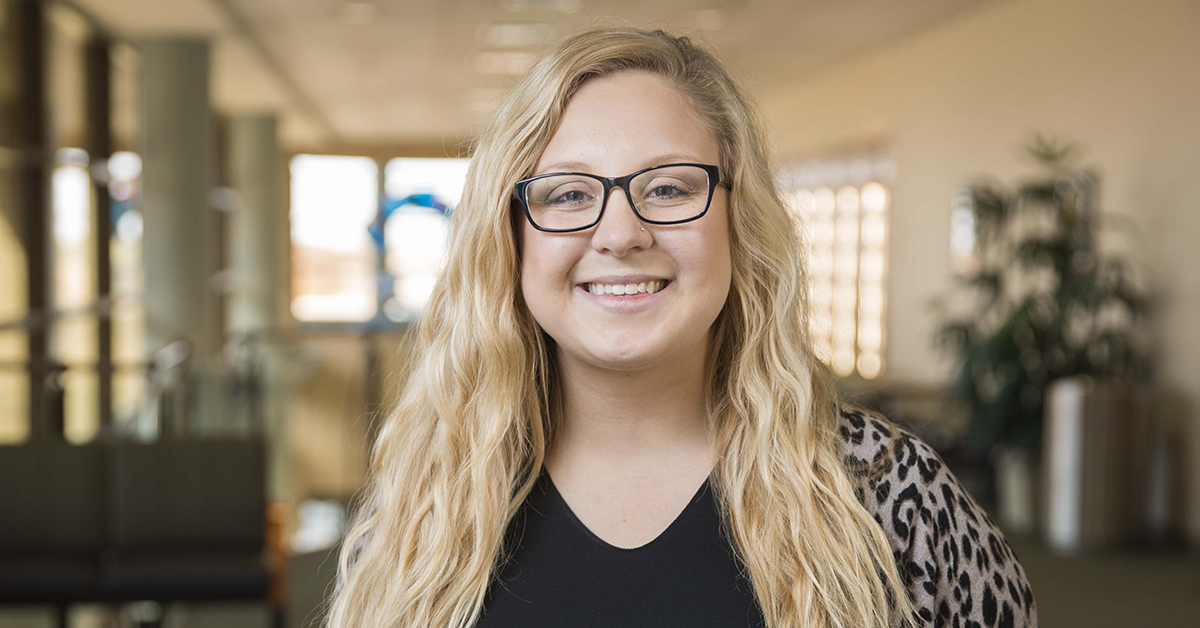From Coyotes to Biofilm Research
Third-year Ph.D. Student Thinks Like a Scientist

As an undergraduate student at Peru State College in Nebraska, Whitni Redman had her first glimpse into research working with coyotes. Trappers brought in coyotes and the research team studied the gastrointestinal tracts of the animals.
“We started to see an increase of wild animals in the city,” Redman said. “We were serving the southeastern part of Nebraska and then parts of Iowa working as parasitologists. We would go through the coyote’s intestinal tract and identify all the parasites that we found and completed surveys. A lot of the parasites that we saw in coyotes could be transmitted to pets and also to humans. It was a great experience.”
For Redman, science was a fascination from an early age. She was born and raised in Holyoke, Colorado. The fourth generation in her family to graduate from the area and the first generation in her family to receive a bachelor’s degree, Redman was drawn to science.
“It was the subject that pushed and challenged me,” Redman said. “There's so much that we don't know, and I wanted to pursue something in science in my undergraduate degree. And now, I am lucky enough to do research at a Ph.D. level. I fell in love with the whole research process.”
Since her university was so small, Redman attended McCook Community College her first year and received her associate’s degree. While she was there, she played on the volleyball team. She also met a science professor who wanted to start doing research at the college. Redman was his first undergraduate to help with what she called her first real research project.
Once she was studying at Peru State College, Redman signed up to work in a research lab with Gul Ahmad, Ph.D., who was a postdoctoral faculty at TTUHSC in the Azfal Siddiqui, Ph.D., research lab that was focusing on pre-clinical development of a vaccine for the human parasitic disease, schistosomiasis.
“Dr. Ahmad was the one who convinced me to pursue a Ph.D. and also the one who convinced me to apply to TTUHSC,” Redman said. “When I was interviewing, I came out here, fell in love with TTUHSC. Everyone was like a family, welcoming and nice. I was really impressed with everyone in the program and the research.”
Currently, Redman works on biofilm research in the Kendra Rumbaugh, Ph.D., lab. Bacteria in infections often times create biofilms. These communities of bacteria can produce EPS, or extra polymeric substances, which makes it difficult for antibiotics to penetrate the infection and kill off the bacteria.
Redman’s research looks at different treatment options with enzymes that break down the glycosidic linkages that are seen within these biofilms. This allows for mass dispersal of the bacteria.
“I’m looking at the efficacy and also looking at the safety of them,” Redman said. “Part of getting this FDA approved is knowing it’s nontoxic. I do a lot of toxicity studies, making sure that we’re not negatively impacting wound healing rates, anything like that.”

Whitman remembers sitting in a dissertation defense by Derek Fleming and hearing him say that biofilms can grow on any medical device.
“I have a big personal interest in women's health,” Redman said. “I was on an estrogen-based birth control and had pulmonary embolisms on both of my lungs last February. That experience pushed me to learn more about women's health in general. Listening to Derek, I wondered if we could see biofilms growing on implanted heart valves or IUDs? I did some research, and there's only about 10 papers published that looked at fungus on IUDs.”
Research studies have shown women with IUDs have the potential to have reoccurring yeast infections. Redman did some investigating and found women with IUDs are actually more prone to bacterial vaginosis, pelvic inflammatory disease and other bacterial infections that can be reoccurring. She pitched the research to Rumbaugh and the lab now is working with Gary Ventolini, M.D., in Odessa to collect samples.
Redman hopes to continue looking at biofilm associated bacterial infections in future research. Chronic wounds impact 2 percent of the United States population at some point in their life. And 85 percent of all bacterial infections are biofilm associated bacterial infections.
“Dr. Rumbaugh has discovered so much in this field, and I hope to continue to work in this area,” Redman said. “It can have vast impact on multiple different types of bacterial infections and being able to clear those out. These infections are complicated because you get the antibiotics and think it's treating the infection and then a few months later you're back with the same infection.
Her most recent research experience is serving as the co-director of the Graduate School of Biomedical Sciences Student Research Week.
“The best thing our school does is train us to think like a researcher,” Redman said. “My first year I struggled because I was so black and white — it's either this or that. Now, my mind's always thinking of questions and the answers that you're receiving lead you to ask another question.”
Redman said she hopes this year’s Student Research Week will help students and faculty from all schools to get excited about research and see the exceptional research at TTUHSC. Her experiences have put her in a mentor position for those who want to pursue science. She added that whether she’s doing research in biofilms, sepsis or other areas she has interest in such as ancient remedies, she can encourage others to love science.
“I love to be a mentor to others, especially to encourage others to succeed,” Redman said.
Related Stories
Celebrating Veterans: TTUHSC’s General Martin Clay’s Legacy of Service and Leadership
From his initial enlistment in the Army National Guard 36 years ago to his leadership in military and civilian health care management roles, Major General Martin Clay’s career has been shaped by adaptability, mission focus and service to others.
Texas Tech University Health Sciences Center School of Nursing Named Best Accelerated Bachelor of Science in Nursing Program in Texas
The TTUHSC School of Nursing Accelerated Bachelor of Science in Nursing (BSN) program has been ranked the No. 1 accelerated nursing program in Texas by RegisteredNursing.org.
TTUHSC Names New Regional Dean for the School of Nursing
Louise Rice, DNP, RN, has been named regional dean of the TTUHSC School of Nursing on the Amarillo campus.
Recent Stories
The John Wayne Cancer Foundation Surgical Oncology Fellowship Program at Texas Tech University Health Sciences Center Announced
TTUHSC is collaborating with the John Wayne Cancer Foundation and has established the Big Cure Endowment, which supports the university’s efforts to reduce cancer incidence and increase survivability of people in rural and underserved areas.
TTUHSC Receives $1 Million Gift from Amarillo National Bank to Expand and Enhance Pediatric Care in the Panhandle
TTUHSC School of Medicine leaders accepted a $1 million philanthropic gift from Amarillo National Bank on Tuesday (Feb. 10), marking a transformational investment in pediatric care for the Texas Panhandle.
Texas Tech University Health Sciences Center Permian Basin Announces Pediatric Residency Program Gift
TTUHSC Permian Basin, along with the Permian Strategic Partnership and the Scharbauer Foundation, Feb. 5 announced a gift that will fund a new pediatric residency.
